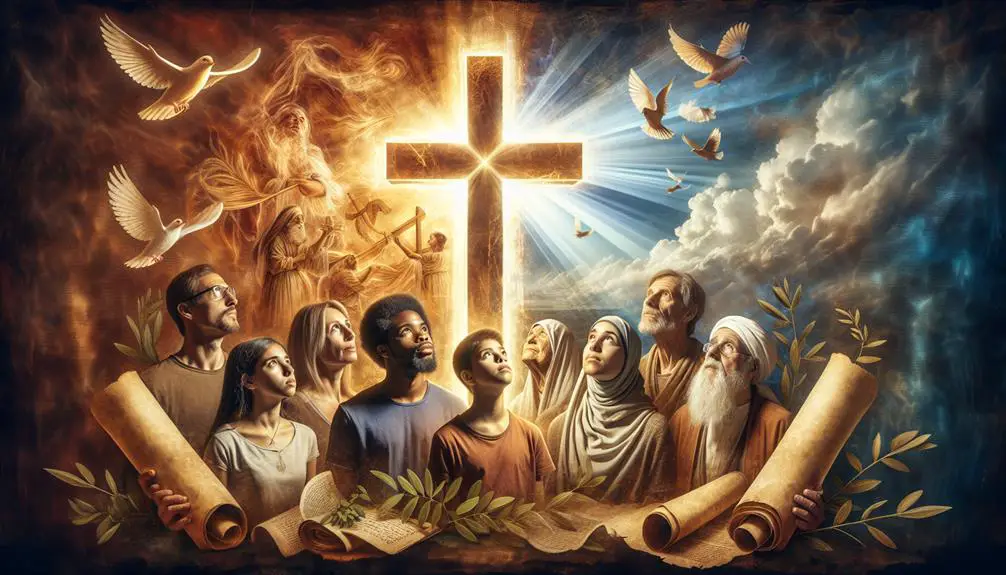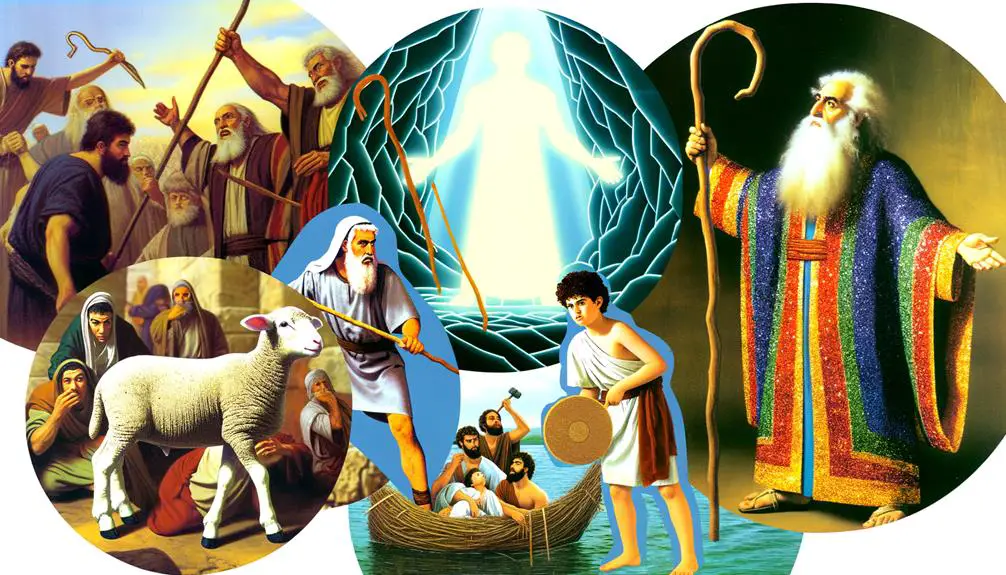Yield to the profound journey of understanding 'Saviour' in the Bible, a term that unveils divine salvation and its impact on humanity.

Saviour Meaning in the Bible
In the grand tapestry of biblical narratives, the term 'Saviour' isn't merely a title; it's a beacon of hope in times of darkness.
You'll find its roots deeply embedded in ancient scripture, from the Old Testament's figures who provided deliverance, to the prophecies heralding the coming of an ultimate Saviour.
This figure, Jesus Christ, reshaped humanity's course, offering salvation on a scale previously unimaginable.
But what does being a 'Saviour' truly entail according to the Bible, and how does this role impact our understanding of divine intervention and human salvation?
Embark on this exploration, and you might uncover insights that challenge your perceptions of salvation and divinity.
Key Takeaways
- 'Saviour' in the Bible signifies deliverance from both physical dangers and moral failures.
- Old Testament figures like Moses and Joseph played roles as saviours, foreshadowing the ultimate Saviour.
- Prophecies in Isaiah and Micah predicted the coming of Jesus Christ as the ultimate Saviour.
- Jesus Christ's life, teachings, and sacrifice redefine salvation, offering humanity a path to eternal life.
Origins of "Saviour" in Scripture

The term 'Saviour' first appears in the Hebrew Scriptures, intricately woven into narratives that underscore God's role as a deliverer and protector of His people. Delving into the etymology and cultural interpretations of 'Saviour' offers a fascinating insight into its profound significance across different epochs and societies.
'Saviour' etymology traces back to the Hebrew word 'Yasha', meaning to save, help in distress, or rescue. Later, in the Greek texts, it transforms into 'Soter', encapsulating not only physical deliverance but also spiritual salvation. This linguistic evolution reflects a deepening understanding of salvation, expanding from immediate physical rescue to encompassing a more profound, spiritual deliverance from sin and its consequences.
Cultural interpretations of the word 'Saviour' vary significantly, influenced by historical context, religious beliefs, and societal values. In ancient cultures, a saviour could be a god, hero, or king who delivers the community from external threats or natural disasters. This concept is vividly illustrated in Greek mythology, where gods and heroes often intervene to save humanity from peril. In contrast, the Judaic perspective, as presented in the Hebrew Scriptures, emphasizes a monotheistic view where God is the ultimate Saviour, delivering His people from oppression and guiding them towards moral and spiritual redemption.
This multifaceted understanding of 'Saviour' underscores the term's rich tapestry of meanings, shaped by linguistic, cultural, and religious influences. It highlights the universal human longing for deliverance and protection, whether from physical dangers or the existential plight of sin and moral failure.
Old Testament Figures as Saviours

Exploring the Old Testament, we encounter numerous figures who embody the role of a saviour, illustrating how individuals were divinely chosen to deliver God's people from adversity. These characters stand as pillars of faith, courage, and divine intervention, each with their unique journey that contributed to the overarching narrative of salvation in the Bible.
- *Moses' leadership* is perhaps one of the most emblematic examples of a saviour in the Old Testament. He not only liberated the Israelites from Egyptian bondage but also guided them through the wilderness, embodying the role of a mediator between God and His people.
- *Deborah's victory* over the Canaanite army is another profound instance of divine salvation. As a judge and prophetess, her leadership and faith led to a significant deliverance for Israel, showcasing the might of God through the courage of a woman.
- Joseph's ascendancy in Egypt, which ultimately saved his family and many others from famine, highlights God's providence and the idea that saviours can emerge from unexpected situations.
- Gideon's unlikely victory against the Midianites, with just 300 men, underscores the theme that God's strength is made perfect in weakness, a pivotal message in the understanding of a saviour.
- Samuel's role in anointing kings and guiding the Israelites reflects the transitional period from judges to monarchs, where the concept of leadership and salvation took on new dimensions.
These figures, among others, demonstrate the multifaceted nature of salvation in the Old Testament, offering insightful perspectives on how divine deliverance was manifested through human agency.
Prophecies of the Coming Saviour

ARTICLE TITLE: Meaning of Saviour in the Bible
CURRENT SUBTOPIC: 'Prophecies of the Coming Saviour'
Throughout the tapestry of the Old Testament, prophecies weave a promise of a future Saviour, foretelling an era of unparalleled salvation and divine intervention. The prophets, with divine foresight, employed Messianic symbols and redemption metaphors, not merely as literary tools, but as profound revelations of God's plan for humanity's ultimate rescue.
Prophecy |
Significance |
|---|---|
Isaiah 7:14 – A virgin shall conceive |
This introduces the miraculous nature of the Saviour's birth, a direct intervention by the divine in human history. |
Micah 5:2 – Out of Bethlehem |
Pinpoints the humble origins of the Saviour, emphasizing the theme of humility and unexpected greatness. |
Isaiah 53 – The suffering servant |
Portrays the Saviour as one who would bear the sins of many, a poignant metaphor for the ultimate sacrifice for redemption. |
These prophecies serve not only as foretellings but also as a framework within which the Jewish people understood their relationship with God. They anticipated a Saviour who would not only deliver them from immediate oppression but would also offer a path to spiritual redemption. The recurring themes of sacrifice, deliverance, and eventual triumph underscore the multifaceted role of the Saviour as both a liberator and redeemer. Through these prophecies, the Bible prepares the spiritual groundwork for understanding the nature of salvation, setting the stage for the arrival of the ultimate Saviour, whose story transcends the limitations of time and history, embodying the eternal promise of redemption.
Jesus Christ: The Ultimate Saviour

In biblical narrative, Jesus Christ emerges as the ultimate Saviour, fulfilling ancient prophecies with His life, death, and resurrection, offering humanity a path to eternal salvation. His journey isn't just a historical account; it's a profound testament to His divine nature and the miraculous deeds that marked His time on earth. Through an analytical lens, you'll see how His actions and teachings revolutionized the concept of salvation.
- Fulfillment of Prophecy: Jesus' birth, ministry, death, and resurrection were foretold by prophets, cementing His role as the predestined Saviour. His life meticulously aligns with these prophecies, offering undeniable evidence of His divine mission.
- Miraculous Deeds: From healing the sick to feeding thousands with minimal resources, Jesus' miracles served as a testament to His divine nature, showcasing His authority over physical and spiritual realms.
- Sacrificial Death: By willingly dying on the cross, Jesus took upon Himself the sins of the world, offering up His life as the ultimate sacrifice. This selfless act opened the gates of forgiveness to all who believe.
- Resurrection Power: His victory over death through resurrection is the cornerstone of Christian faith, symbolizing the power of God to grant eternal life to those who trust in Jesus.
- Message of Love and Redemption: Throughout His ministry, Jesus preached love, forgiveness, and the kingdom of God, inviting all to partake in this new covenant of salvation.
Analyzing Jesus' life, it's clear His purpose was to serve as the bridge between humanity and God, fulfilling the ancient longing for a Saviour through His divine presence and miraculous deeds.
The Saviour's Impact on Humanity

Jesus Christ's embodiment as the Saviour has profoundly reshaped humanity's spiritual landscape, fostering a transformative journey towards redemption and eternal life. This profound influence extends beyond the confines of religious doctrine, permeating various aspects of human culture and morality. Through modern interpretations of His life and teachings, a broader understanding of His impact emerges, one that underscores a universal call to love, compassion, and justice.
His ethical teachings, especially those concerning love, forgiveness, and service to others, have become foundational principles in numerous societal norms and legal frameworks. You'll find His influence in the emphasis on human rights, the pursuit of social justice, and the compassion towards the marginalized. These ethical teachings haven't only shaped personal behaviors but have also inspired movements for societal change.
Moreover, modern interpretations of Jesus Christ's role as the Saviour have facilitated a dialogue between diverse religious traditions, fostering mutual respect and understanding. This interfaith engagement enriches our collective spiritual heritage, encouraging a shared commitment to peace and human dignity.
In examining the Saviour's impact on humanity, it's clear that His presence resonates far beyond the confines of Christian theology. Whether in the realm of ethics, social justice, or interfaith dialogue, His teachings continue to inspire a vision of a more compassionate and equitable world. As you reflect on this legacy, consider how these principles can inform your actions and contribute to the collective well-being of humanity.
Frequently Asked Questions
How Does the Concept of a Savior Vary Across Different Cultures and Religions Outside of Christianity?
When you explore the concept of a savior across cultures and religions outside of Christianity, you'll find fascinating variations.
Hindu Avatars, for instance, embody divine intervention directly in the world, representing God's presence and guidance.
In contrast, Islamic Messianism focuses on a future figure who'll lead and restore justice.
Both concepts, though differing in nature and theology, reflect a universal longing for salvation and guidance in human cultures.
In What Ways Has the Interpretation of the Term 'Savior' Evolved Within Christian Theology Over the Centuries?
Within Christian theology, the interpretation of 'savior' has undergone a metamorphosis, much like a caterpillar transforming into a butterfly. Initially rooted in literal rescue, Savior symbolism has evolved, reflecting theological shifts over centuries.
These changes showcase a deepening understanding of salvation's complexity. You'll find that early interpretations focused on physical deliverance, whereas modern readings emphasize spiritual and moral salvation, highlighting a nuanced, multifaceted view of what it means to save and be saved.
Are There Any Debated or Controversial Figures in History Whom Some Groups Consider a Savior but Others Do Not, Within or Outside of the Biblical Context?
You're diving into how historical revisions and the notion of political saviors have sparked debates. Throughout history, figures like Che Guevara or Winston Churchill are hailed as saviors by some, yet criticized by others. These controversies stem from differing views on their actions and impacts.
Analyzing these figures requires a deep understanding of the context and consequences of their leadership, illustrating how interpretations of 'savior' can widely vary outside biblical references.
How Do Modern Psychological or Sociological Theories Interpret the Human Need for or Belief in a Savior Figure?
You might think the concept of a savior is outdated, yet modern theories shed new light on it.
Psychological projection and the hero archetype play pivotal roles in understanding this human inclination. Essentially, you project your ideals and aspirations onto a figure perceived as a savior, seeing them as embodiments of the hero archetype.
This reflects a deep psychological need for guidance, hope, and a figure to aspire to, offering a fresh analytical perspective.
Can the Idea of a Savior Be Found in Secular Contexts, and if So, How Is It Typically Represented or Understood?
Absolutely, the concept of a savior isn't confined to religious texts. In secular contexts, it often manifests through the hero archetype and cultural messiahs. These figures are understood as individuals or symbols embodying salvation or liberation, tackling societal issues or personal struggles.
Their stories resonate deeply, reflecting our collective longing for heroes who navigate the complexities of human existence, ultimately offering hope or solutions. This interpretation enriches our understanding of savior figures beyond religious frameworks.
Conclusion
In analyzing the biblical narrative, it's clear: from the shadows of the Old Testament's heroes to the light of the New Testament's Christ, the concept of a saviour evolves, deepens, and culminates.
You've journeyed from ancient prophecies to the fulfillment in Jesus Christ, the ultimate Saviour whose impact on humanity is both profound and unparalleled.
This evolution mirrors humanity's own spiritual journey from darkness to light, from despair to hope, illustrating the transformative power of salvation's promise through ages.



Sign up